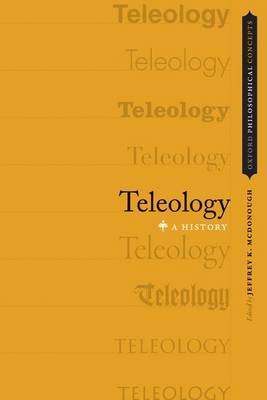
Door een staking bij bpost kan je online bestelling op dit moment iets langer onderweg zijn dan voorzien. Dringend iets nodig? Onze winkels ontvangen jou met open armen!
- Afhalen na 1 uur in een winkel met voorraad
- Gratis thuislevering in België vanaf € 30
- Ruim aanbod met 7 miljoen producten
Door een staking bij bpost kan je online bestelling op dit moment iets langer onderweg zijn dan voorzien. Dringend iets nodig? Onze winkels ontvangen jou met open armen!
- Afhalen na 1 uur in een winkel met voorraad
- Gratis thuislevering in België vanaf € 30
- Ruim aanbod met 7 miljoen producten
Zoeken
€ 125,45
+ 250 punten
Uitvoering
Omschrijving
Teleology is the belief that some things happen, or exist for the sake of other things. It is the belief that, for example, salmon swim upstream in order to spawn, and that bears have claws for the sake of catching fish. This volume takes up the intuitive yet puzzling concept of teleology as it has been treated by philosophers from ancient times to the present day. It includes nine main chapters centered on the treatment of teleology in Plato, Aristotle, the Islamic medieval tradition, the Jewish medieval tradition, the Latin medieval tradition, the early modern era, Kant, Hegel, and contemporary philosophy. Each chapter probes central questions such as: is teleology inherent in its subjects or is it imposed on them from the outside? Does teleology necessarily involve intentionality, that is, a subject's cognizing some end, goal, or purpose? What is the scope of teleology? Is it, for example, applicable to elements and animals, or only to rational beings? Finally, is teleology
explanatory? When we say that salmon swim upstream in order to spawn, have we explained why they swim upstream? When we say that bears have claws for catching fish, have we explained why bears have claws? The philosophical discussions of the main chapters are enlivened and contextualized by four reflection pieces exploring the implications of teleology in medicine, art, poetry, and music.
explanatory? When we say that salmon swim upstream in order to spawn, have we explained why they swim upstream? When we say that bears have claws for catching fish, have we explained why bears have claws? The philosophical discussions of the main chapters are enlivened and contextualized by four reflection pieces exploring the implications of teleology in medicine, art, poetry, and music.
Specificaties
Betrokkenen
- Auteur(s):
- Uitgeverij:
Inhoud
- Aantal bladzijden:
- 320
- Taal:
- Engels
- Reeks:
Eigenschappen
- Productcode (EAN):
- 9780190845711
- Verschijningsdatum:
- 25/05/2020
- Uitvoering:
- Hardcover
- Formaat:
- Genaaid
- Afmetingen:
- 226 mm x 146 mm
- Gewicht:
- 476 g

Alleen bij Standaard Boekhandel
+ 250 punten op je klantenkaart van Standaard Boekhandel
Beoordelingen
We publiceren alleen reviews die voldoen aan de voorwaarden voor reviews. Bekijk onze voorwaarden voor reviews.











